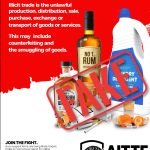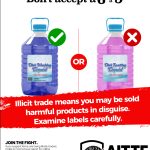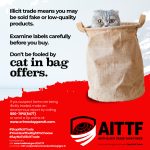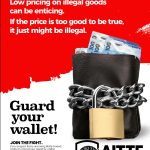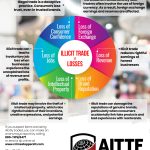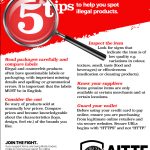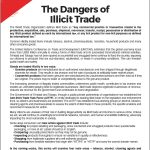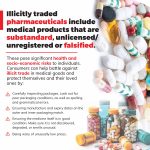
WHO WE ARE
The Anti-Illicit Trade Task Force (AITTF) is a public-private partnership of organisations involved in combatting illicit trade in Trinidad and Tobago. Senator the Honourable Paula Gopee-Scoon, Minister of Trade and Industry, conferred appointments on its eleven members on May 17, 2021.
The AITTF is co-chaired by the Permanent Secretaries of the Ministry of Trade and Industry and the Ministry of National Security.
Along with the Ministry of Trade and Industry and the Ministry of National Security, representation on the task force includes the Customs and Excise Division, the Financial Intelligent Unit of the Ministry of Finance, the Intellectual Property Office (Office of the Attorney General and Legal Affairs), the Ministry of Agriculture, Land, and Fisheries, the Ministry of Health’s Chemistry, Food, and Drugs Division, the Trinidad and Tobago Bureau of Standards, the Trinidad and Tobago Police Service, Crimestoppers Trinidad and Tobago, the Trinidad and Tobago Chamber of Industry and Commerce, and the Trinidad and Tobago Manufacturers’ Association.
WHAT WE DO
The AITTF was created to coordinate the implementation of the National Action Plan to Combat Illicit Trade in Consumer Goods in Trinidad and Tobago.
Approved by Cabinet in March 2021, the National Action Plan prescribes twenty-six specific measures aimed at achieving the following five general objectives:
The AITTF, which is organised into sub-working groups on alcohol, tobacco, cleaning agents, and pharmaceuticals, works to assess the extent of illicit trade in these products, identify specific enablers, and recommend measures for further action.
In addition, the task force implements awareness campaigns to inform consumers how to detect and report illicit products and know the associated dangers they can pose. The AITTF also reviews enforcement of penalties for illicit trade.
AITTF MEMBERS
The AITTF currently comprises nine public sector ministries and agencies, one non-governmental organisation and two private sector organisations. As required, the task force may co-opt additional members.
Members include:
- Ministry of Trade and Industry
- Ministry of National Security
- Customs and Excise Division, Ministry of Finance
- Financial Intelligence Unit of Trinidad and Tobago, Ministry of Finance
- Intellectual Property Office, Office of the Attorney General and Legal Affairs
- Ministry of Agriculture, Land and Fisheries
- Chemistry, Food and Drugs Division, Ministry of Health
- Trinidad and Tobago Bureau of Standards
- Trinidad and Tobago Police Service
- Crime Stoppers Trinidad and Tobago (non-governmental organisation)
- Trinidad and Tobago Manufacturers’ Association (private sector organization)
- Trinidad and Tobago Chamber of Industry and Commerce (private sector organization)
RESOURCES
There are many categories of illicitly traded consumer goods. The AITTF currently has four such working groups categorized according to our focused areas: tobacco, alcohol, cleaning agents, and pharmaceuticals. A fifth working group has since been added to treat with legislative review.
Tobacco
According to the West Indian Tobacco Company (WITCO) and an independent study undertaken by the Trinidad and Tobago Manufacturers’ Association in collaboration with Anatol Research Institute, illegally traded cigarettes constitute between 5 to 10 percent of the local market. Utilising Trinidad and Tobago’s Estimates of Revenue for the Financial Year 2020, WITCO approximated tax evasion from illicit trade in tobacco to be as high as TT$30 million in 2020, taking into consideration Excise Duties and accounting for Value Added Tax, Corporation Tax, and Green Fund Tax.
See here for packaging and labelling requirements for tobacco products under the Tobacco Control Act.
License holders must have the following on their labels:
-
- The country of intended sale on the pack,
- Name and address of the manufacturer,
- A label in English,
- A declaration which states “Smoke from this product contains extremely addictive nicotine and toxic substances such as tar and carbon monoxide. No safe level of consumption exists for this product.”
In addition, visit here for the Tobacco Control Unit’s (TCU) listing of license holders. As the regulator of tobacco and tobacco products, the TCU publishes an exhaustive list of authorized license holders and their associated brands via their website. To this end, consumers can refer to this publication to easily detect contraband cigarette brands and distinguish between legal and illegal manufacturers and/or distributors of tobacco in Trinidad and Tobago.
Members of the public may also visit the Ministry of Health’s “Public Notice: Illicit Tobacco Products” for a list of unlicensed/illicit tobacco products that should NOT be offered for sale, purchased by any business entity/ member of the public, or consumed by the public.
Alcohol
Estimates form the AITTF Working Group on Alcohol indicate 22 percent of all imported spirits enter the country illegally. Major importers of spirits—A.S. Bryden and Sons (Trinidad) Limited, Massy Distribution (Trinidad) Limited, and Alstons Marketing Company Limited (AMCO)—have estimated losses of approximately TT$61.4 million in 2019 due to illegal importation.
Labelling and marking requirements can help consumers detect illicitly traded distilled spirits and other alcohol products. Here is a brief checklist of things to look for:
- The shape of the bottle is consistent with the brand.
- The brand name, logo design, or markings are correct.
- The closure is properly sealed.
- Lot codes / manufacture codes are visible.
- The percentage of alcohol by volume is visible (for distilled spirits).
- The colour and consistency of the liquid is as expected.
- Taste is as expected.
- Pricing (the price of illicit alcohol may be noticeably lower than legitimate products).
Cleaning Agents
The Trinidad and Tobago Bureau of Standards has noted non-conformances in various cleaning products, related to both labelling and performance requirements, when inspected or tested against the relevant National Compulsory Standards. The distribution of inferior products results in loss of value to the consumer and exposes them to microbial health risks.
During the period 2018 – 2020, the TTBS conducted nationwide surveys in laundry detergent. Also in 2020, the TTBS conducted a survey on household cleaning chemicals. The agency visited manufacturers, distributors, and retailers, including roadside vendors.
Altogether, 791 cleaning products (196 laundry powder products; 176 laundry liquid, pods, and bars; and 419 household cleaning chemicals) were surveyed. About 580 of those items were non-conforming. (That is 381 of the household cleaning chemicals, 149 of the laundry liquid, pods, and bars; and 50 of the laundry powder products.)
As part of its regulatory mandate, the TTBS regularly engages all stakeholders in discussion to bring their products into compliance with the relevant National Compulsory Standard.
The following are signs consumers should pay attention to when purchasing cleaning chemicals, which may indicate a contraband or counterfeit product:
- Grammatical and/or spelling errors on the product packaging;
- Lack of proper labelling/missing information (especially manufacturer’s or distributor’s physical address and contact details);
- Flimsy or shoddy packaging using substandard materials;
- Deals that appear “too good to be true”/unusually low prices;
- Incorrect fonts or colours used in logos, brand names, and trademarks; and
- Missing safety seals (where applicable).
Pharmaceuticals
According to Crime Stoppers Trinidad and Tobago, the list of illicit pharmaceuticals locally include birth control and weight loss pills, medication for chronic diseases such as high blood pressure, and erectile dysfunction medication among others (2019).
The website notes, “In many instances the drug is a bit cheaper than in other retail outlets and such items are normally of inferior quality containing the incorrect proportion of the active ingredient or no active ingredients [altogether].”
Fake drugs often appear similar to authentic ones, despite containing harmful substances such as chalk, powered concrete, cement, and boric acid (Partnership for Safe Medicines, n.d.).
Identifying fake medications may even require laboratory tests; however, consumers and health care workers may be able to recognise discrepancies in the appearance of the medication, its packaging, and effectiveness.
Here are a few guidelines (republished from Crimestopperstt.com):
- Purchase from legitimate suppliers and well-established, reputable pharmacies.
- Pay attention to the price. If the price is too good to be true, it just might be.
- Examine the expiry date. A missing expiry date or an expired item is a sign that something is wrong.
- Inspect the packaging. Check for spelling or grammatical errors and ensure that the writing is in English.
- If you have any doubts about the medication, do not buy it. Make enquiries from an authorized supplier.
For more on identifying substandard or falsified medical products, and to learn about their impacts see the WHO factsheet.
Sources:
Crime Stoppers Trinidad & Tobago Limited. “Part 2: Illicit Pharmaceuticals Will “Hurt” You.” November 14, 2019. https://crimestopperstt.com/illicit-pharmaceuticals-will-hurt-you/.
Partnership for Safe Medicines. “Learn About Contraband And Counterfeit Drugs.” Accessed April 20, 2022. https://www.safemedicines.org/learn.
Legislative Review
In addition to the four main AITTF Working Groups, a fifth group has been added to treat with related legislation, including the review or strengthening of different acts in Trinidad and Tobago as they pertain to matters of trade.
Piracy describes the illicit trade (unlawful downloading, copying, distribution or use) of copyrighted music, electronic books, games, software, and films. It also applies to the streaming of those types of content without authorization.
How to identify pirated products:
- Examine the quality of the product. The quality of genuine products is often higher than pirated products.
- Carefully observe packaging. The packaging of infringing goods sometimes contains misleading or wrong information. Many rights holders mark their products with holograms, control numbers and/or other security measures. These can assist consumers in understanding whether the product is original or not.
- Verify if logos and trademarks are displayed correctly. At first glance, an infringing product may appear identical to the genuine one; however, upon closer inspection there may be differences. For example, logos may be badly reproduced and trademarks deliberately or accidentally misspelled.
In addition, if you suspect an item is pirated, check out the website of the manufacturer/ producer of the genuine product. Many rights holders have information on their websites to help customers detect fakes, including pictures and descriptions of the originals.
For more on piracy click Intellectual Property Office.
WHAT IS ILLICIT TRADE?
Illicit trade is any practice or conduct prohibited by law that relates to the production, shipment, receipt, possession, distribution, sale, or purchase including any practice or conduct intended to facilitate such illegal activity of any good or service.*
Some characteristics of illicit trade include the smuggling of goods, the creation of fake or unauthorized replicas of a product, the adulteration of products, and the evasion of taxes.
Glossary of Illicit Trade Terms:
Contraband/smuggling refers to undeclared importation of goods.
Counterfeit describes fake or unauthorized replicas of a product.
Adulteration of products refer to the mixing of food or drugs with matter of an inferior and sometimes harmful quality.
Tax evasion occurs when products are deliberately misclassified according to the Harmonized Commodity Description and Coding System /HS Code (which results in the incorrect import duty percentage being applied) or under-invoiced (which results in a decreased value of import duty being calculated).
For a comprehensive list of the types of illicit trade and the harm caused globally, see the World Economic Forum’s Illicit Trade Annex.
* United States Food and Drug Administration
WHAT ARE THE IMPACTS OF ILLICIT TRADE?
The effects of illicit trade are far reaching, impacting government, local businesses, and consumers. With illicit trade practices, tax revenue is forfeited by the government, legitimate businesses are undermined and negatively impacted by counterfeit goods; and the health, safety, and well-being of consumers are jeopardized by substandard goods.
Illicit trade may affect businesses and the economy in the following ways:
- Loss of revenue and market share for legitimate businesses;
- Intellectual property theft (and in some instances stolen data) acts as a dis-incentive to investment in innovation and research & development;
- Diminished brand integrity and market reputational value for local businesses who may sell authentic versions of an illicit product;
- Job displacement for workers and business closures because of lost revenue and market share;
- Decreased revenue for the government as a result of tax evasion (which occurs when goods are either imported illegally or misclassified to avoid applicable duties); and
- Decreased foreign exchange reserves as US dollars are utilised to purchase these commodities.
RELATED LINKS
Crime Stoppers Trinidad and Tobago Illicit Trade Archives
TTMA Illicit Trade Desk
CONTACT : AITTF SECRETARIAT
The AITTF secretariat is located at the Ministry of Trade and Industry headquarters in Port of Spain and can be contacted at (868)623-2931-4 exts. 2403, 2413 and 2411.

